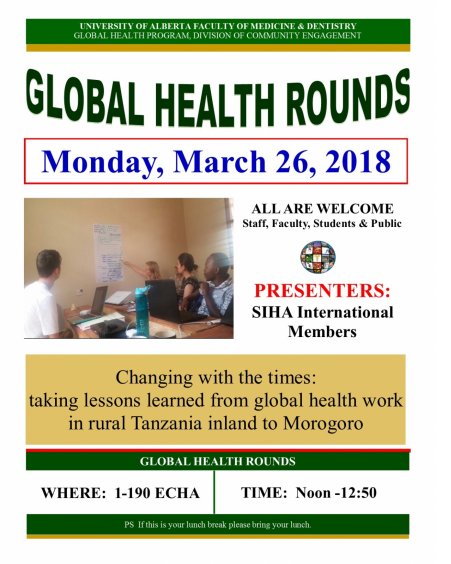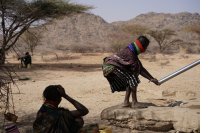Feedback/Comments from Our Readers
|
 Comments, questions and feedback is always welcome. Comments, questions and feedback is always welcome.
|
|
Global Health Rounds - March 26, 2018
|

We're always looking for new speakers and ideas for topics for Global Health Rounds for the new coming up academic year in the Fall 2018. If you have speakers or topics, please contact Cheryl Knowles at GHFoMD@ualberta.ca. |
|
Hotter, Drier, Hungrier: How Global Warming Punishes the World’s Poorest
|
 These barren plains of sand and stone have always known lean times: times when the rivers run dry and the cows wither day by day, until their bones are scattered under the acacia trees. But the lean times have always been followed by normal times, when it rains enough to rebuild herds, repay debts, give milk to the children and eat meat a few times each week.
Times are changing, though. Northern Kenya — like its arid neighbors in the Horn of Africa, where Secretary of State Rex W. Tillerson paid a visit last week, including a stop in Nairobi — has become measurably drier and hotter, and scientists are finding the fingerprints of global warming. According to recent research, the region dried faster in the 20th century than at any time over the last 2,000 years. Four severe droughts have walloped the area in the last two decades, a rapid succession that has pushed millions of the world’s poorest to the edge of survival.
To read more about this article go to https://www.nytimes.com
|
|
Why Potentially Dodgy Diabetes Drugs Dominate in India
|
 "India is the diabetes capital of the world!" "India is the diabetes capital of the world!"
That was a headline two years ago in the Times of India. And that's not a case of media hype. India has a huge diabetes problem: nearly 70 millionpeople are grappling with the disease.
India also has a prolific pharmaceutical industry pumping out hundreds of innovative drugs to treat diabetes and other ailments. But researchers say it's unclear how well some of these medicines work, or even if they're safe, because the drugs haven't gone through adequate clinical trials.
"We're really puzzled as to why many of these medicines are available," says Allyson Pollock, the director of the Institute of Health and Society at Newcastle University in England, "because some of these weren't even approved by the medicines regulator in India."
Pollock and her colleagues have just come out with an analysis of regulatory approval procedures for diabetes drugs in the Indian state of Maharashtra. The findings reinforce her skepticism.
One example involves the drug metformin, a workhorse of diabetes treatment. According to the Mayo Clinic metformin is usually the first medicine prescribed to people with type 2 diabetes, helping control high blood sugar. In the U.S. most metformin comes in pills in which metformin is the only active ingredient.
To read more about this article go to https://www.npr.org
|
|
Hookworms can suppress malaria infection
|
 A team of ecologists has shed light on why anti-hookworm treatment may result in a worsening of malaria in patients simultaneously infected with the different parasites responsible for these two infestations. Sarah Budischak, post-doctoral fellow, and others at the Princeton University, examined data from an earlier Indonesian study of 4,000 patients carrying both malaria and hookworm parasites. They concluded that the two pathogens compete for a common food source — red blood cells in the host’s internal ecosystem. Although deworming may provide net health benefits to human populations, the Princeton study, published last month (February) in the journal Ecology Letters, suggests that it has the potential to exacerbate the severity of some malaria infections. “Our study suggested that hookworms could reduce the intensity of malaria caused by the Plasmodium vivax parasite two- to three-fold”
To read more about this article go to https://www.scidev.net
|
|
Syria: The voice from the hospital basement in East Ghouta
|
 Most people in East Ghouta, Syria live underground. Medical care is increasingly provided in basements. What is happening there cannot bear the light of day.
I recently spoke to one of the directors of a hospital MSF has been supporting since 2013 in East Ghouta. The discomfort of sitting in a safe office in Brussels grew as she described the detail of her and her colleagues’ struggle.
This young, confident doctor explained that the last five years of siege and on-off bombing and shelling have been very difficult, but nothing compared to the last month. She admitted that she could scarcely find words to describe the situation. Her hospital has been converted from a five-floor building, but nowadays they can only use the basement, as they feel that may offer some protection in the case of a shell or bomb strike.
In their basement they have set up several Operating Theatres but the nearest Intensive Care Unit is several kilometres away and the road is too dangerous. The doctor told me about a bombing the previous day, close to the hospital. Seven dead, of whom three were children, and 30 wounded patients were rushed in.
When we spoke, she was completely exhausted. She and her colleagues had done 17 major surgical operations in the previous 24 hours – including general, orthopaedic and vascular surgeries – with limited equipment and supplies. I asked how the patients were doing, and she told me one of her patients had died. But not all was bad; the other 16 patients were stable.
|
|
How African Governments Can Tackle the Migration Crisis
|
 It is estimated that in 2015, 15 million African-born migrants were living outside the continent. In the past few years, thousands have risked their lives trying to cross the Mediterranean Sea bound for Europe, in search of better opportunities. Tragically, many of them only get as far as the Sahara Desert or the middle of the sea where they, unfortunately, meet their demise.
The main factor driving this migration is simply the failure of their governments to provide them with opportunities within their countries of origin. I lament most African government’s overdependence on aid or some form of assistance from the western world; and worry that there is no end in sight.
To read more about this article go to http://weblog.iom.int
|
|
|
|
Save the Dates of Local Events!
|
Annual Rich Man Poor Man Dinner Event 2018
April 7, 2018
Time: 6:00 pm to 9:30 pm
Please note if you have any resaleable items for the SIHA silent auction, please email me at GHFoMD@ualberta.ca. Thanks for those who donate. |
|
Conferences, Symposiums & Lectures
|
Save this link to your favorites as I update it daily will all events, symposiums, etc., just click here.
=========================
Global Health & Innovation Conference
April 14-15, 2018
Yale University
New Haven, CT
|
|
Call for Abstracts/Submissions
|
Global Health & Innovation Conference at Yale on
April 14-15, 2018
is calling for abstracts.
|
|
Newsletter & Special Journal Editions
|
|
|